Specialization Course
An overview into all courses in Pharmacology, such as Advanced Pharmacology, Pharmacological and Toxicological Screening, and Cellular and Molecular Pharmacology.
Faculty of Pharmacy
Department of Pharmacology
Gnanagangothri Campus
Full Time
2
Pharmacologists have become an integral part of both preclinical and clinical research and play an essential role in molecular or in vitro pharmacology, which is considered important to aid drug discovery and development. Thus, the demand for skilled pharmacologists is continuously increasing and reflecting an expansion of pharmaceutical industry. According to a report from Precision Business Insights, the global clinical pharmacology market size was valued at $48,376.3 million in 2022. It is expected to grow at a compound annual growth rate (CAGR) of 8.5% from 2023 to 2029.
The M. Pharm Pharmacology course is an advanced programme designed for individuals preparing experts in the study of drugs and their effects on living organisms. The programme delves into the principles of pharmacodynamics, pharmacokinetics, and drug toxicity, providing a comprehensive understanding of drug action at the molecular and physiological levels.
Under the M Pharm in pharmacology syllabus, students engage in advanced coursework, laboratory research, and clinical studies, preparing them to contribute to drug development, safety assessment, and personalised medicine. They benefit from a curriculum that integrates the latest advancements in the field, ensuring they are well-prepared to address the complex challenges of drug discovery and development in a rapidly evolving healthcare landscape.
The M. Pharm in Pharmacology scope extends to various roles in academia, research institutions, pharmaceutical companies, regulatory bodies, and healthcare organisations. Additionally, students can go for higher education options such as a Ph.D. in Pharmacology.
| Course | Credits |
|---|---|
| Modern Pharmaceutical Analytical Techniques - PLF501 | 4 |
| Advanced Pharmacology – PLC502 | 4 |
| Pharmacological and Toxicological Screening Methods – PLC503 | 4 |
| Cellular and Molecular Pharmacology - PLC504 | 4 |
| Pharmacology Practical - PLL505 | 6 |
| Seminar/Assignment - PLS506 | 4 |
| Course | Credits |
|---|---|
| Advanced Pharmacology – PLC507 | 4 |
| Pharmacological and Toxicological Screening Methods – PLC508 | 4 |
| Principles of Drug Discovery - PLC509 | 4 |
| Clinical Research and Pharmacovigilance - PLC510 | 4 |
| Pharmacology Practical - PLL511 | 6 |
| Seminar/Assignment - PLS512 | 4 |
| Course | Credits |
|---|---|
| Research Methodology and Biostatistics - PLF613 | 4 |
| Journal Club - PLF614 | 1 |
| Group project - PLF615 | 4 |
| Discussion/synopsis Presentation (Proposal Presentation) - PLF616 | 2 |
| Research Work - PLF617 | 14 |
| Course | Credits |
|---|---|
| Journal Club - PLF618 | 1 |
| Discussion/Interim - Final Presentation - PLF619 | 3 |
| Research Work - PLF620 | 16 |
| Participation/Presentation: National/International Seminar, Conferences, Workshops - PLF621 | 1 |
| Publication: National / International Journals - PLF622 | 1 |
| Academic/Research award: State/National/International Agencies - PLF623 |
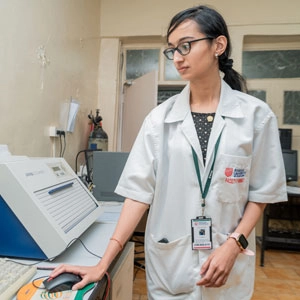
An overview into all courses in Pharmacology, such as Advanced Pharmacology, Pharmacological and Toxicological Screening, and Cellular and Molecular Pharmacology.
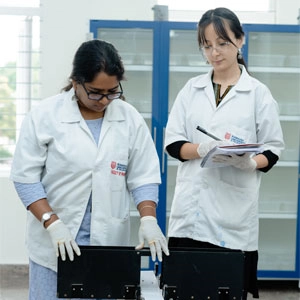
Includes Research Methodology, Biostatistics, and the Journal Club.
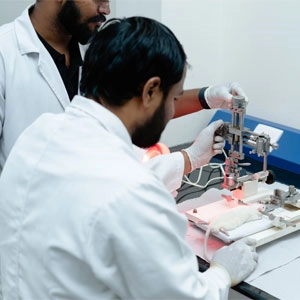
All students are to participate in publishing presenting papers at national and international seminars, conferences and workshops as well as reputed journals.
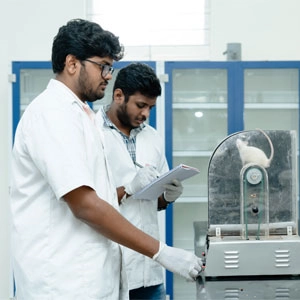
An introduction to professional and personal development, language courses and life skills. Work towards this is for contributing to the spirit of inquiry and learning techniques in research, critical analysis, consulting literature, and growing acquainted with the latest advances in medical science.
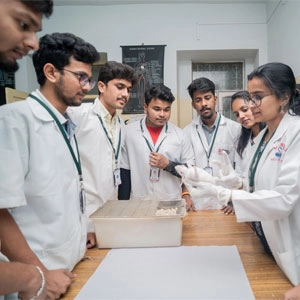
Students can work on a common project with various faculty members from multiple disciplines to earn credits. The group has to design, develop and evaluate a drug moiety, a dosage form, a product, and data or process in their area of specializations.
Students can earn 1 – 3 credits by participating in the international competitions, or with a presentation in a conference or publication in a journal that wins awards. Students can earn additionally 1 – 3 credits through participation in international competitions through technical work, and be exempted from a elective course.
A group of 5 students can work on a project of an interdisciplinary nature and be constituted of members across departments of the faculty.
Students can opt for internships in an pharmaceutical industry or research organizations. Alternatively, students can undertake a mini-project requiring self-directed study that can be pursued within the affiliated Faculty. It is also necessary for the student to submit a report and make a presentation to the members of the panel constituted by the HoD for assessment.
During each semester, students’ performance is assessed through Continuous Evaluation (CE) which includes teacher interaction, sessional examination and a Semester End Examination (SEE). Students are awarded grades based on the marks scored.
There are two parts to this course, a dissertation and publication. Each student has to choose a relevant topic and work individually to write the dissertation. The topic needs to be approved by the committee constituted by HoD. Publication is a stage wherein dissertation work of the student is converted into a technical paper to be published in reputed conferences/journals
Panpharmacon Student Club is an extended student wing of Department of Pharmacology. The club is named after quarterly E – newsletter of the department Panpharmacon & was conceptualized with a vision to support and encourage students to thrive beyond academics. Club primarily focuses on three domains: Education, Research & Social Service.
Fee Structure 2025–26
| Course | Total Fees Per Year |
|---|---|
| M.Pharm Pharmacology | Rs. 400,000 |
15 Seats
Choosing the right programme, keeping track of important dates, attending entrance exams, and submitting the necessary paperwork can make applying for a programme quite an overwhelming experience. Here, we try to answer some Frequently Asked Questions that might help you with the process of admission.
Since the University offers a host of different programmes with varying eligibility criteria, we recommend visiting the Programme page for all programme-specific details.
MPharm Pharmacology offers career opportunities in drug research, clinical trials, regulatory affairs, teaching and pharmaceutical companies, with potential for higher studies like a PhD and roles in R&D.
MPharm in Pharmacology is a postgraduate programme focusing on drug action, therapeutic uses, adverse effects and research methodologies, preparing students for careers in pharmaceutical and biomedical industries.
A pharmacy focuses on preparing and dispensing medications, while pharmacology studies drug actions. Both have value; pharmacy suits clinical practice, pharmacology leans toward research and drug development.
A bachelor's degree in pharmacology typically takes 3–4 years, while postgraduate studies like MPharm or MSc require an additional 2 years for advanced specialisation.
Understand basic physiology first, then learn drug classifications, mechanisms, and side effects. Use mnemonics, case studies, flowcharts, and regular revision to retain pharmacological concepts effectively.
Heritage Building, Gnana Gangothri Campus New BEL Road, MSR Nagar, Bengaluru-58
Phone 080 4536 6616
Mobile +91 80100 04444